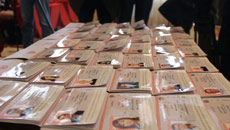Maithripala Sirisena, elected to govern Sri Lanka, was once jailed for alleged links to leftwing Sinhalese rebels who almost ousted the government in 1971. He remained in prison for 15 months.
And if luck had not been on his side, Sirisena might have been assassinated by the Tamil Tigers who attacked his convoy in a suburb here in 2008, leaving one person dead.
A devout Buddhist from the majority Sinhalese community, Sirisena, 63, was for long a loyalist of outgoing president Mahinda Rajapaksa until he dramatically defected to the opposition in November.
That one act -- a night after he shared a meal of "hoppers" (rice pancakes) with the president -- undid whatever hopes Rajapaksa might have had of winning Thursday's election.
Once Sirisena became the joint opposition candidate, he turned Rajapaksa's most vocal and bitter critic, accusing the man he had stood by for years of promoting "family rule" in Sri Lanka.
When the Rajapaksa regime militarily crushed the Liberation Tigers of Tamil Eelam (LTTE) in May 2009, Sirisena was the defence minister. But the glory of vanquishing the Tigers went to Rajapaksa.
When Rajapaksa did not make him the prime minister, Sirisena began to hold a grudge -- one that spurred his defection in November.
Like many in Rajapaksa's Sri Lanka Freedom Party (SLFP) to which he belonged until last year, Sirisena's political thoughts make him hang the pictures of Buddha, Marx, Lenin and Mahatma Gandhi at his home.
Yet he espouses no particular ideology. A family man, he is passionately opposed to smoking and liquor.
Although he earned the backing of the Tamil National Alliance (TNA), the main Tamil party in parliament, Sirisena has refused to dismantle military camps in the north and east -- the former war zone.
But he says he will be happy to do business with Tamils who have embraced democracy -- whatever their past.
Like Rajapaksa once did, Sirisena appeals to the ordinary Sinhalese, most of whom are Buddhists although some are Christians too.
In his first comments after Rajapaksa conceded defeat Friday, Sirisena pledged to promote Buddhism, the state religion. He also promised not to take "revenge" against political foes.
Unlike Rajapaksa, Sirisena attracted the support of Muslims in the Thursday battle due to rising attacks on them by hardline Buddhists linked to the Rajapaksa regime.
Most Tamils, sullen and bitter since thousands died in the war on the LTTE, also appear to have thrown their lot with Sirisena simply because of their dislike of Rajapaksa.
When he announced his candidacy in November, he said that Sri Lanka was heading towards a dictatorship.
"The entire economy and every aspect of society is controlled by one family," he thundered.
Rajapaksa later complained publicly that Sirisena defected after having a meal of "hoppers" with him.
Sirisena, Rajapaksa said, "eats hoppers in the night and then stabs you in the back in the morning".
The majority of Sri Lankans did not agree with Rajapaksa's assessment.





